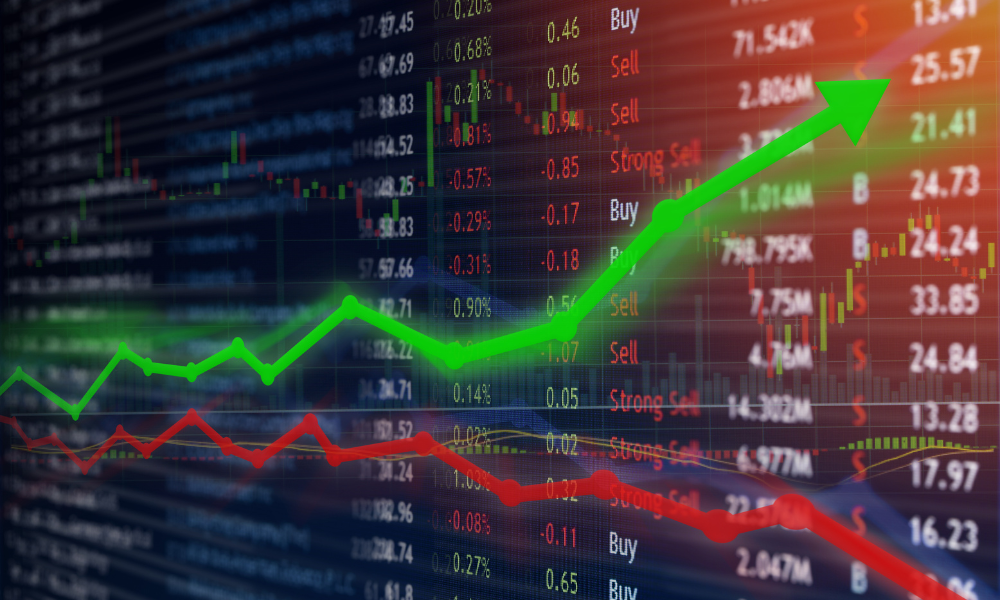

by Sujata Rao and Sagarika Jaisinghani
Europe’s equity rally paused and bonds extended their slide after President Donald Trump’s latest tariff threats stoked concern about a widening trade war.
The Stoxx 600 Index held steady after hitting a record high on Tuesday, taking year-to-date gains to about 10%. Movers included Glencore Plc which slipped to the lowest in more than three years after posting a fall in profits, while medical equipment maker Royal Philips NV sank more than 10% as it predicted anemic Chinese demand.
China’s recent tech-led advance also stumbled, after Trump brandished possible levies of around 25% on automobile, semiconductor and pharmaceutical imports. His comments added to the fragile picture for markets this week, as tentative hopes for an end to the war in Ukraine were tempered by the exclusion of Ukrainian and European officials from US-Russia talks held on Tuesday.
Some investors are also growing concerned about the outcome of Germany’s national election on Sunday.
“I have been selling quite a lot over the last two days as Europe is now pricing the best possible scenario for the next catalysts, which is the Ukraine ceasefire and German elections,” said Alberto Tocchio, a portfolio manager at Kairos Partners. “The situation might get bumpy as both events are going to be more complicated than what the market thinks.”
US equity futures pointed to modest gains on Wall Street, with contracts on the S&P 500 up about 0.1%.
Super Micro Computer Inc. rallied in premarket trading after the beleaguered chipmaker issued an aggressive long-term revenue outlook and pledged to meet a Nasdaq deadline to file audited financial results. Arista Networks Inc. dropped on concerns over the computer networking firm’s reliance on revenues from Meta Platforms Inc.
In bond markets, yields edged higher, with 10-year German bund yields — the benchmark borrowing rate for the euro area — up about ten basis points this week. Investors are pricing increased government spending on defense should the war in Ukraine draw to an end.
“When you think about the outcome of any peace treaty between Ukraine and Russia, that will involve a huge uplift in defense spending from European countries,” said Lilian Chovin, head of asset allocation at Coutts & Co. “That will obviously put a floor on how low bond yields can move and will sustain higher-for-longer yields in Europe.”
US Treasury yields also ticked up, as San Francisco Federal Reserve chief Mary Daly echoed the view of other rate-setters that monetary policy needs to stay restrictive until inflation slows further.
Her comments, alongside tariff concerns, helped the dollar hold steady against G-10 peers. The pound pared gains sparked by a UK inflation report showing hotter-than-forecast headline CPI, as traders focused on services prices rising less than expected.
Gold priced stayed near record highs, benefiting from its safe-haven appeal.
Later Wednesday, traders will focus on minutes from the Fed’s most recent interest-rate meeting for clues on the potential impact of increased tariffs on inflation and interest rates.
Key events this week:
Some of the main moves in markets:
This story was produced with the assistance of Bloomberg Automation.
Copyright Bloomberg News

From outstanding individuals to innovative organizations, find out who made the final shortlist for top honors at the IN awards, now in its second year.

Cresset's Susie Cranston is expecting an economic recession, but says her $65 billion RIA sees "great opportunity" to keep investing in a down market.

“There’s a big pull to alternative investments right now because of volatility of the stock market,” Kevin Gannon, CEO of Robert A. Stanger & Co., said.

Sellers shift focus: It's not about succession anymore.

Platform being adopted by independent-minded advisors who see insurance as a core pillar of their business.
RIAs face rising regulatory pressure in 2025. Forward-looking firms are responding with embedded technology, not more paperwork.
As inheritances are set to reshape client portfolios and next-gen heirs demand digital-first experiences, firms are retooling their wealth tech stacks and succession models in real time.
